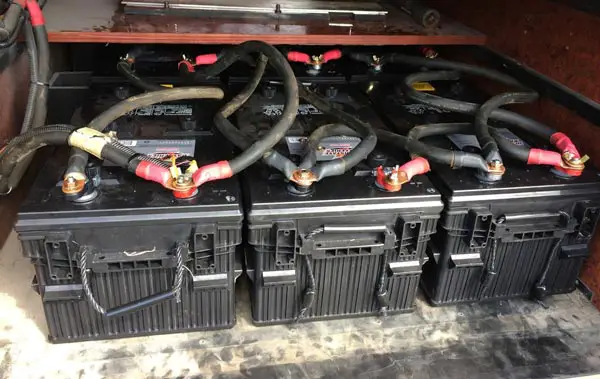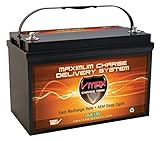
Best Overall: Optima's BlueTop Starting & DeepCycle Marine
This battery offers reliable performance and dependability. It serves a double function, too, as a starting and deep cycle battery, so you'll be able to use it for a long period.
Plus, it's practically maintenance-free. Its well-sealed housing is prone to damage on the outside, but it doesn't leak or spill. You'll also find extra heavy-duty lead plates that ensure uninterrupted performance.
Moreover, this battery is versatile enough to be put in solar panels and off-grid systems too.
PROS
CONS
Best Budget RV Battery: UPG's Sealed Lead Acid
No products found.
This battery is one of the best products by the Universal Power Group. It promises a long battery life between charges.
This battery is made with absorbed glass mat technology, which means that it's ideal for charging travel trailers, as well as many electrical devices, ATVs, and even wheelchairs and golf carts.
The model is super easy to mount and use. With its durability, you can expect years of faithful service.
PROS
CONS
Best Boon-docking RV Battery: VMAX Solar's Vmaxtanks Vmaxslr125
This model consists of heavy-duty alloys and high-quality components, making it one of the most long-lasting on the market, without asking for maintenance.
Vmaxtanks is ideal for all types of terrains due to its design. It handles impacts and shocks without a hitch. Besides, it's not affected by weather or temperature changes.
Another excellent feature is the low self-discharge rate, which makes it charge your motorhome more efficiently.
PROS
CONS
Best RV DeepCycle Battery: Odyssey's PC680
PC680 features rugged, solid construction, making it 100% weather-proof. The heavy-duty design makes its lifespan long without maintenance, allowing you to use it for years, even in off-grid settings.
The pure lead plates make for a no-spill or leak design, even with shocks and vibrations from your RV. It boasts thrice the lifespan and doubles the amount of power of ordinary AGM batteries.
This battery will give you excellent performance at a competitive price, too.
PROS
CONS
FAQs for Buying RV Batteries
In this section, we'll respond to common questions about this device.
What are the Different Types of RV Batteries?
When looking for your ideal type of battery, remember that there are three most commonly used by RV owners - AGM technology, gel, and flooded cell batteries.
Besides these models, you could go for a lithium RV battery, which is efficient and more lightweight than its competitors. RVs batteries are available in a variety of voltages, including 12-volt battery and 6-volt batteries.
Flooded Cell Batteries
This kind tends to come at a lower price than others. However, it asks for distilled water filling to prevent mineral build-up - even more prevalent in hot temperatures. So, it will require maintenance on your part, as well as terminal cleaning.
Gel Battery
This battery features jelled electrolytes, which prevents spilling. It requires less maintenance than the previous type, as well as providing longer AMP hours. It also comes with a fiberglass mat around the lead plates, adding to its durability.
AGM Batteries
This type is the priciest, but you get long-lasting, maintenance-free performance.
What Is a DeepCycle RV Battery?
The deep cycle battery usually consists of thicker plates than common types of vehicle batteries. It's meant for recharging and discharging repeatedly. It's the best choice for dry camping, boondocking, and off-grid settings.
How to Recharge an RV Battery?
There are several ways to do this task. You may use solar power or wind energy, generators, battery, and converter chargers. The method you choose should depend on your cell, as improper battery charging leads to damage.
It's also possible to charge your battery while driving. You'll need cables, voltage controlled relays, and Anderson plugs.
How Long Do RV Batteries Last?
No matter whether you buy it on Amazon or in a specialized store, the battery cycle life will depend on its type, usage, and maintenance.
To ensure your battery meets its intended age, check for complete care instructions. Besides, you will need a good RV battery charger depending on your type of choice.
What Battery Size Do I Need?
It depends on your power requirements, as well as the hours you're running your onboard devices. Larger batteries store more power, as a rule. You’ll need to think about how much power your trip requires and pick accordingly.
What Are the Advantages of a Lithium RV Battery?
Lithium-ion is a deep cycle battery that is more lightweight than other types of car batteries. Most people also prefer it for their recreational vehicles, choosing it over different brands.
How to Install an RV Battery?
Follow the steps to install your battery:
Turn off the power drawing appliances (including lights).
Check the position of the battery to polarity.
Remove the old battery by disconnecting the negative cables first.
Check that the hold-down hardware and carrier have no corrosion.
Clean the terminal posts.
Connect the cables.
Turn on the appliances and check whether your new battery is working.
How to Maintain an RV Battery?
When it comes to deep cycle batteries, let it drain for 50% before recharging. Also, for any type, make sure to avoid overcharging and not to store it when it's discharged - it leads to the plates crystalizing.






